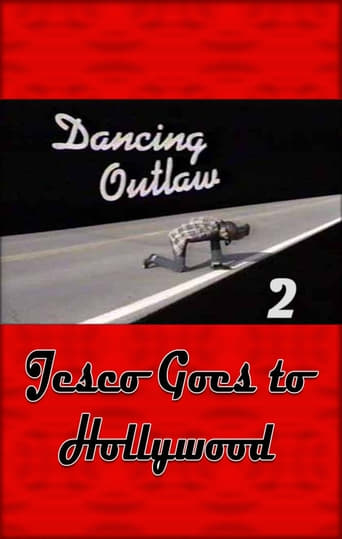Steve Pulaski
Dancing Outlaw II: Jesco Goes to Hollywood opens with our title character, infamous Boone County, West Virginia tap-dancer Jesco White, tapping his way down the Hollywood Walk of Fame, with numerous passersby looking on with perplexing curiosity as our hero then bows with his hand square on Elvis Presley's star. The shot is whimsical and projects a nice feeling of seriousness in the documentary's source material, and it shows the confidence and the lax behavior of White himself. I can barely walk down the street without fearing someone is judging me in some way. I could never imagine dancing down the Walk of Fame.This is the sequel to the documentary, Dancing Outlaw, which premiered in 1991 on PBS. This is a twenty-eight minute long-endeavor, yet it feels under-stayed as we still find White being an enormous enigma just as much as he was at the beginning by the time we reach the final frame. He told us in the first documentary that the next time we'd see him he would be larger than life, and as the title spells out for us, Jesco is leaving behind his roots in Boone County for a trip to Hollywood to guest star on Roseanne and meet Roseanne Bar (at the time "Roseanne Arnold") and Tom Arnold. This is Jesco's biggest break and it's undoubtedly one of the happiest times we've seen in this man's life, considering the up-and-down nature of his emotions in the first documentary.News reports tells us that Jesco has become something of a cult phenomenon in West Virginia, and is known to make several public appearances for pizza and a six-pack of Coke. He does it for his fans, and they wave goodbye, some with tears in their eyes, as they see him board the plane for Hollywood. When he arrives, before shooting his scenes for Roseanne, he tells us he desperately wants to give Hollywood some of that "Boone County rhythm," which explains why he feels the need to dance in public so often.What is the most surprising about this short is not only how kind and genial Jesco becomes around even celebrities like Roseanne Barr, Tom Arnold, and John Goodman, but how comfortable and seemingly excited about everyday life since his last documentary. He doesn't take anything for granted, and makes very clear that he believes in treating everyone the same, despite noticeable differences. "You think there's a lot of nuts in Boone County, but you go to Los Angeles, you got the whole nut city." The adventures we have with the known dancer himself are fun to watch and easy to get into, and the interactions with the cast of Roseanne are warm and filled with positivity. By the end, we are benefited from learning about two different cultures and seeing what occurs when they clash unexpectedly, and our main character learns just exactly what a swastika is and who exactly Adolf Hitler was. In the end, both parties come out fulfilled.Starring: Jesco White, Roseanne Barr, Tom Arnold, and John Goodman. Directed by: Jacob Young.
coex
This film's brevity strongly implies that this was done solely to milk the Jesco gravy train one more time. While the first documentary certainly stunk of exploitation, it was Jesco's wonderful charm that ultimately won us over! This second one lacks almost all of Jesco's charm in favor of a pathetic "hillbilly in the big city" schtick. One has to stop and wonder how much better both versions would have been if they were done by more skilled hands like the Maysles Brothers.But, also worth noting, in this post-Borat world, it's amazing how close the filmmakers were here in doing something a bit more fun and original! So it was even more of a disappointment that they couldn't even get exploitation right!
James Morrison
All 'Dancing Outlaw' stand as examples of questionable ethics in documentary film-making, which predate the recent disgraceful trends in 'reality TV' towards voyeurism to the extent of subject exploitation. Throughout, it's difficult to tell whether Jacob Young (himself a native West Virginian) is presenting Jesco in an attempt to create a well-rounded but sympathetic representation of his character, or whether this is a mere pretence for some ever-popular 'point and laugh at the redneck' fare. This sequel in particular leaves a nasty taste in the mouth - particularly the scene in which Jesco is pretty much forced by Tom Arnold, at the request of a furious Roseanne, to cover his lopsided swastika tattoo (the connotations of which were unknown to Jesco) with three ludicrously overlarge and ugly roses, only for Jesco's scene to be left on the cutting room floor. Throughout his Hollywood 'adventure', Jesco carries himself with the air of a true southern gentleman, but is treated so utterly patronisingly it's difficult to watch.Overall, it stands as a testament to the division, not merely within celebrity culture, but in American society, between the haves and have-nots, and the perpetuation of these disadvantages as perfectly viable public entertainment. This documentary seems to portray Jesco's story - as superficially as possible - as one of rags to riches. If you ask Jesco, however, who is reportedly steeped in more poverty and strife than ever, he'll doubtlessly tell you a different story. Only, unfortunately for him, there are no cameras left around to hear it.
magellan333
The second glimpse of the character Jesco does not deliver like the first. In DO2, Jesco travels to California. Funny that in California, his behavior doesn't seem as eccentric compared to that of some southern California's residents'. Jesco's "big city" experience and tattoo removal does not make for a very interesting documentary. Seeing Jesco on his own terms and his own turf surrounded by family and friends who know and love him is much more interesting than this attempt to make him a "fish out of water".


